| Listing 1 - 10 of 13 | << page >> |
Sort by
|
Book
Year: 2007 Publisher: Piscataway, New Jersey : Institute of Electrical and Electronics Engineers,
Abstract | Keywords | Export | Availability | Bookmark
 Loading...
Loading...Choose an application
- Reference Manager
- EndNote
- RefWorks (Direct export to RefWorks)
Supercomputers --- Parallel processing (Electronic computers)
Book
Year: 2007 Publisher: Piscataway, New Jersey : Institute of Electrical and Electronics Engineers,
Abstract | Keywords | Export | Availability | Bookmark
 Loading...
Loading...Choose an application
- Reference Manager
- EndNote
- RefWorks (Direct export to RefWorks)
Supercomputers --- Parallel processing (Electronic computers)
Book
Year: 2007 Publisher: Aberdeen Proving Ground, MD : Army Research Laboratory,
Abstract | Keywords | Export | Availability | Bookmark
 Loading...
Loading...Choose an application
- Reference Manager
- EndNote
- RefWorks (Direct export to RefWorks)
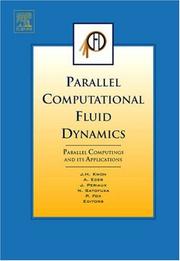
ISBN: 1281019143 9786611019143 0080550045 0444530355 9780444530356 9780080550046 Year: 2007 Publisher: Amsterdam : Elsevier,
Abstract | Keywords | Export | Availability | Bookmark
 Loading...
Loading...Choose an application
- Reference Manager
- EndNote
- RefWorks (Direct export to RefWorks)
The proceedings from Parallel CFD 2006 covers all aspects of parallel computings and its applications. Although CFD is one of basic tools for design procedures to produce machineries, such as automobiles, ships, aircrafts, etc., large scale parallel computing has been realized very recently, especially for the manufactures. Various applications in many areas could be experienced including acoustics, weather prediction and ocean modeling, flow control, turbine flow, fluid-structure interaction, optimization, heat transfer, hydrodynamics.- Report on current research in the field in an ar
Fluid dynamics --- Parallel processing (Electronic computers) --- Supercomputers --- Data processing --- Dynamics --- Fluid mechanics
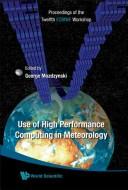
ISBN: 1281928933 9786611928933 9812775897 9789812775894 9781281928931 9789812775887 9812775889 6611928936 Year: 2007 Publisher: Singapore Hackensack, NJ World Scientific
Abstract | Keywords | Export | Availability | Bookmark
 Loading...
Loading...Choose an application
- Reference Manager
- EndNote
- RefWorks (Direct export to RefWorks)
Geosciences particularly numerical weather predication, are demanding the highest levels of computer power available. This volume provides an overview of the achievements and plans for the use of parallel techniques in the fields of meteorology, climatology and oceanography.
Atmospheric physics --- Meteorology --- Parallel processing (Electronic computers) --- Supercomputers --- Aerology --- Atmospheric science --- Aerophysics --- Meteorology, Physical --- Physical meteorology --- Mathematical models --- Data processing
Book
ISBN: 0769530494 1509089845 Year: 2007 Publisher: [Place of publication not identified] IEEE Computer Society
Abstract | Keywords | Export | Availability | Bookmark
 Loading...
Loading...Choose an application
- Reference Manager
- EndNote
- RefWorks (Direct export to RefWorks)
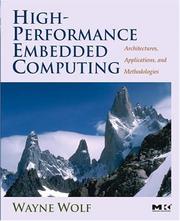
ISBN: 9780123694850 012369485X 9780080475004 0080475000 1281004103 9786611004101 Year: 2007 Publisher: Amsterdam Boston Elsevier/Morgan Kaufmann Publishers
Abstract | Keywords | Export | Availability | Bookmark
 Loading...
Loading...Choose an application
- Reference Manager
- EndNote
- RefWorks (Direct export to RefWorks)
Over the past several years, embedded systems have emerged as an integral though unseen part of many consumer, industrial, and military devices. The explosive growth of these systems has resulted in embedded computing becoming an increasingly important discipline. The need for designers of high-performance, application-specific computing systems has never been greater, and many universities and colleges in the US and worldwide are now developing advanced courses to help prepare their students for careers in embedded computing.High-Performance Embedded Computing: Architectures, Appli
Computer. Automation --- embedded systems --- Embedded computer systems. --- High performance computing. --- Embedded computer systems --- High performance computing --- HPC (Computer science) --- Electronic data processing --- Cyberinfrastructure --- Supercomputers --- Embedded systems (Computer systems) --- Computer systems --- Architecture Analysis and Design Language
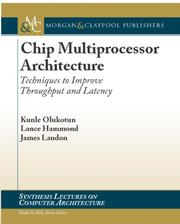
ISBN: 159829122X 1598291238 9781598291230 9781598291124 Year: 2007 Publisher: San Rafael, Calif (1537 Fourth Street, San Rafael, CA 94901 USA) Morgan & Claypool Publishers
Abstract | Keywords | Export | Availability | Bookmark
 Loading...
Loading...Choose an application
- Reference Manager
- EndNote
- RefWorks (Direct export to RefWorks)
Chip multiprocessors - also called multi-core microprocessors or CMPs for short - are now the only way to build high-performance microprocessors, for a variety of reasons. Large uniprocessors are no longer scaling in performance, because it is only possible to extract a limited amount of parallelism from a typical instruction stream using conventional superscalar instruction issue techniques. In addition, one cannot simply ratchet up the clock speed on today's processors, or the power dissipation will become prohibitive in all but water-cooled systems. Compounding these problems is the simple fact that with the immense numbers of transistors available on today's microprocessor chips, it is too costly to design and debug ever-larger processors every year or two.
Computer architecture. --- High performance processors. --- Parallel processing (Electronic computers). --- Computer Science --- Engineering & Applied Sciences --- Multiprocessors. --- Electronic digital computers --- Multiprogramming (Electronic computers) --- Parallel processing (Electronic computers) --- Architecture, Computer --- Processors, High performance --- High performance computing --- Microprocessors --- Multiprocessors --- Parallel programming (Computer science) --- Supercomputers --- Chip multiprocessors (CMPs) --- Multi-core microprocessors. --- Parallel processing. --- Throughput sensitive applications. --- Latency-sensitive applications. --- SPEC benchmarks. --- Java applications. --- JRPM virtual machine. --- Transactional memory.
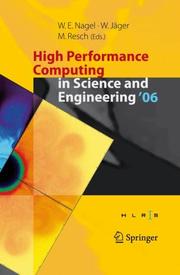
ISBN: 1280956763 9786610956760 3540361839 3540361650 3642071600 Year: 2007 Publisher: Berlin ; New York : Springer,
Abstract | Keywords | Export | Availability | Bookmark
 Loading...
Loading...Choose an application
- Reference Manager
- EndNote
- RefWorks (Direct export to RefWorks)
The last two years have been great for high performance computing in Baden- W¨ urttemberg and beyond. In July 2005, the new building for HLRS as well as Stuttgart’s new NEC supercomputer – which is still leading edge in G- many – have been inaugurated. In these days, the SSC Karlsruhe is ?nalizing the installation of a very large high performance system complex from HP, built from hundreds of Intel Itanium processors and more than three th- sand AMD Opteron cores. Additionally, the fast network connection – with a bandwidth of 40Gbit/s and thus one of the ?rst installations of this kind in Germany – brings the machine rooms of HLRS and SSC Karlsruhe very close together. With the investment of more than 60 Million Euro, we – as the users of such a valuable infrastructure – are not only thankful to science managers and politicians, but also to the people running these components as part of their daily business, on a 24-7 level. Sinceabout18months,therearelotsofactivitiesonallscienti?c,advisory, and political levels to decide if Germany will install an even larger European supercomputer, where the hardware costs alone will be around 200 Million Euro for a ?ve year period. There are many good reasons to invest in such a program because – beyond the infrastructure – such a scienti?c research tool will attract the best brains to tackle the problems related to the software and methodology challenges.
High performance computing --- Science --- Engineering --- Data processing --- HPC (Computer science) --- Electronic data processing --- Cyberinfrastructure --- Supercomputers --- Computer science --- Chemistry. --- Computer science. --- Computational Mathematics and Numerical Analysis. --- Theoretical and Computational Chemistry. --- Mathematics of Computing. --- Theoretical, Mathematical and Computational Physics. --- Mathematics. --- Informatics --- Physical sciences --- Computer mathematics --- Discrete mathematics --- Mathematics --- Computer mathematics. --- Chemistry, Physical and theoretical. --- Computer science—Mathematics. --- Mathematical physics. --- Physical mathematics --- Physics --- Chemistry, Theoretical --- Physical chemistry --- Theoretical chemistry --- Chemistry
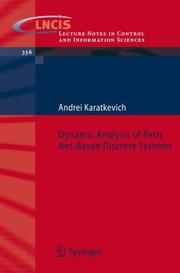
ISBN: 9783540714644 3540714642 9786610951604 1280951605 3540715606 Year: 2007 Publisher: Berlin, Germany : Springer,
Abstract | Keywords | Export | Availability | Bookmark
 Loading...
Loading...Choose an application
- Reference Manager
- EndNote
- RefWorks (Direct export to RefWorks)
Design of modern digital hardware systems and of complex software systems is almost always connected with parallelism. For example, execution of an object-oriented p- gram can be considered as parallel functioning of the co-operating objects; all modern operating systems are multitasking, and the software tends to be multithread; many complex calculation tasks are solved in distributed way. But designers of the control systems probably have to face parallelism in more evident and direct way. Controllers rarely deal with just one controlled object. Usually a system of several objects is to be controlled, and then the control algorithm naturally turns to be parallel. So, classical and very deeply investigated model of discrete device, Finite State Machine, is not expressive enough for the design of control devices and systems. Theoretically in most of cases behavior of a controller can be described by an FSM, but usually it is not convenient; such FSM description would be much more complex, than a parallel specification (even as a network of several communicating FSMs).
Petri nets. --- Discrete-time systems. --- Parallel processing (Electronic computers) --- Réseaux de Pétri --- Systèmes échantillonnés --- Parallélisme (Informatique) --- Electronic books. -- local. --- Parallel processing (Electronic computers). --- Digital control systems --- Discrete-time systems --- Petri nets --- Mechanical Engineering - General --- Algebra --- Mathematics --- Mechanical Engineering --- Engineering & Applied Sciences --- Physical Sciences & Mathematics --- Design and construction --- DES (System analysis) --- Discrete event systems --- Sampled-data systems --- Engineering. --- System theory. --- Control engineering. --- Robotics. --- Mechatronics. --- Control, Robotics, Mechatronics. --- Systems Theory, Control. --- Graph theory --- Nets (Mathematics) --- High performance computing --- Multiprocessors --- Parallel programming (Computer science) --- Supercomputers --- System analysis --- Linear time invariant systems --- Systems, Theory of --- Systems science --- Science --- Philosophy --- Systems theory. --- Mechanical engineering --- Microelectronics --- Microelectromechanical systems --- Automation --- Machine theory --- Control engineering --- Control equipment --- Control theory --- Engineering instruments --- Programmable controllers --- Design and construction. --- Automatic control --- Electronic digital computers --- Discrete mathematics
| Listing 1 - 10 of 13 | << page >> |
Sort by
|

 Search
Search Feedback
Feedback About UniCat
About UniCat  Help
Help News
News